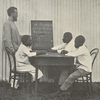‘Removing the Youth from their Pernicious Environment’: Child Separation Practices in South Dutch New Guinea, 1902-1921
DOI:
https://doi.org/10.18352/bmgn-lchr.10874Abstract
This article examines practices of child separation in South Dutch New Guinea during the first two decades of colonial administration and missionary presence, spanning the years 1902-1920. By examining the ways in which the Dutch Catholic missionary priests and brothers of the Missionaries of the Sacred Heart of Jesus (Missionnaires du Sacré Coeur – MSC) sought to ‘civilise’ the Marind-anim and reconfigure Marind society, I argue that this ‘civilising’ project concentrated on the management, control and transformation of bodies and bodily practices – especially those of children. This project only appeared to be feasible in what I define as ‘spaces of transformation’, constituted by the mission’s boarding schools and new model villages, in which missionaries could establish some degree of authority. Designed specifically to separate Marind youth and socialise them in a manner distinct from that undergone by their parents, these institutions enhanced missionary efforts to transform Marind society by interrupting the transmission of knowledge and practice from one generation to the next.
Dit artikel onderzoekt praktijken die erop gericht waren kinderen uit hun oorspronkelijke milieu te verwijderen in het zuidelijke deel van Nederlands Nieuw-Guinea tijdens de eerste twee decennia van het koloniaal bestuur en de katholieke missie van 1902-1920. De analyse van de manieren waarop Nederlandse katholieke missionarissen en broeders van de Missionaires du Sacré Coeur (MSC) de Marind-anim en hun samenleving wilden hervormen toont aan dat dit ‘beschavingsproject’ zich concentreerde op het controleren en transformeren van lichamen en lichamelijke praktijken, met name op die van kinderen. Dergelijke ‘beschavingspraktijken’ werden alleen uitvoerbaar geacht in die ruimtes waar de Nederlandse priesters en broeders een zekere mate van gezag konden uitoefenen. Kostscholen en modeldorpen, die in dit artikel als ‘spaces of transformation’ worden gedefinieerd, werden speciaal opgezet om Marind kinderen en jongvolwassenen tijdelijk aan hun oorspronkelijke omgeving te onttrekken, zodat de overdracht van kennis en praktijken van de oudere generatie op de jongere generatie onderbroken werd. De missionarissen beschouwden dit als de enige mogelijke werkwijze om de kinderen te socialiseren op een manier die wezenlijk verschilde van de opvoedingspraktijken van hun ouders.
Downloads

Published
Issue
Section
License
Copyright (c) 2021 BMGN - Low Countries Historical Review

This work is licensed under a Creative Commons Attribution-NonCommercial 4.0 International License.
Authors who publish with this journal agree to the following terms:
a) Authors retain copyright and grant the journal right of first publication with the work simultaneously licensed under a Creative Commons Attribution 4.0 International (CC BY 4.0) that allows others to share the work with an acknowledgement of the work's authorship and initial publication in this journal.
b) Authors are able to enter into separate, additional contractual arrangements for the non-exclusive distribution of the journal's published version of the work (e.g., post it to an institutional repository or publish it in a book), with an acknowledgement of its initial publication in this journal.
c) Authors are permitted to post their work online (e.g., in institutional repositories or on their website) prior to and during the submission process.
Authors are explicitly encouraged to deposit their published article in their institutional repository.











